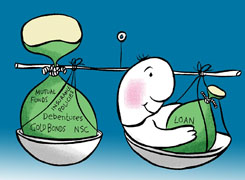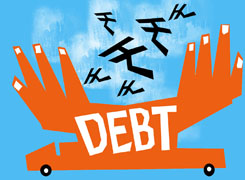Drowning in Debt: How Can I Escape This 8.5 Lac Trap?
Ramalingam Kalirajan |10874 Answers |Ask -Follow
Mutual Funds, Financial Planning Expert - Answered on Jan 23, 2025
He has an MBA in finance from the University of Madras and is a certified financial planner.
He is the director and chief financial planner at Holistic Investment, a Chennai-based firm that offers financial planning and wealth management advice.... more

I am in debt trape around 8.5 lac with personal loan and credit card due
You have a debt of Rs 8.5 lakh, including personal loans and credit card dues.
This high-interest debt can strain your financial health and impact your investment goals.
Paying off these debts should be your immediate priority to secure your financial future.
Impact of Debt on Your Retirement Goal
The interest on credit card dues and personal loans is often very high.
High-interest debt reduces your disposable income for investments and savings.
Clearing your debts first will help you allocate funds towards achieving your Rs 2 crore goal.
Immediate Action Plan
Step 1: Prioritise Debt Repayment
Focus on paying off high-interest credit card dues first.
Use any available surplus or savings to reduce your debt immediately.
Avoid taking additional loans or credit until you clear existing liabilities.
Step 2: Consolidate Your Debt
Explore a low-interest personal loan to consolidate all high-interest debts.
This reduces the overall interest burden and simplifies repayment.
Ensure timely EMIs for the consolidated loan to maintain financial discipline.
Step 3: Budget and Reduce Expenses
Track your monthly expenses and cut non-essential spending.
Allocate more funds towards debt repayment to clear it faster.
Use budgeting apps or simple spreadsheets to monitor your progress.
Step 4: Avoid Credit Dependency
Stop using credit cards until all dues are cleared.
Use a debit card or cash to control spending and avoid further debt accumulation.
Build an emergency fund to handle unexpected expenses without using credit.
Reviewing Your Investment Plan
Achieving Rs 2 crore by 2030 is possible but requires strategic adjustments.
Currently, your priority should be clearing the Rs 8.5 lakh debt.
Once debts are cleared, invest aggressively towards your retirement goal.
Lump Sum Investment
Your Rs 15 lakh lump sum should not be invested before clearing debts.
After clearing debts, invest the lump sum strategically in equity mutual funds.
Consider systematic transfer plans (STPs) to reduce market timing risks.
Portfolio Rebalancing
Review your Rs 42 lakh portfolio for performance and alignment with your goal.
Ensure proper allocation across large, mid, and small-cap funds for balanced growth.
Avoid over-concentration in any single fund or asset category.
Importance of Professional Guidance
Engage with a certified financial planner to realign your portfolio.
Professional guidance helps select funds that match your risk profile and goals.
Regular funds, with expert advice, provide better support than direct funds.
Why Avoid Index Funds?
Index funds lack active management and fail to outperform during market corrections.
Actively managed funds deliver better returns with professional fund management.
A certified planner ensures better fund selection and periodic portfolio review.
Tax Considerations for Investments
LTCG above Rs 1.25 lakh from equity mutual funds is taxed at 12.5%.
STCG from equity mutual funds is taxed at 20%.
Tax-efficient investments and strategic withdrawals will optimise your post-tax returns.
Building a Debt-Free Future
Emergency Fund
Create an emergency fund covering 6–12 months of expenses.
This prevents dependence on credit during unforeseen events.
Adequate Insurance Cover
Ensure sufficient health and term insurance to protect your family financially.
Avoid investment-cum-insurance products like ULIPs and endowment plans.
Future SIP Contributions
Once debt is cleared, start SIPs to steadily build your retirement corpus.
SIPs in diversified equity funds can generate inflation-beating returns over time.
Final Insights
Clearing your Rs 8.5 lakh debt should be your immediate priority.
Post debt repayment, focus on achieving your Rs 2 crore retirement corpus.
Strategic investments in actively managed funds can help you achieve this goal.
Regular reviews and disciplined financial habits ensure long-term success.
Best Regards,
K. Ramalingam, MBA, CFP,
Chief Financial Planner,
www.holisticinvestment.in
https://www.youtube.com/@HolisticInvestment
You may like to see similar questions and answers below
Milind Vadjikar | Answer |Ask -Follow
Insurance, Stocks, MF, PF Expert - Answered on Sep 29, 2024
Milind Vadjikar | Answer |Ask -Follow
Insurance, Stocks, MF, PF Expert - Answered on Feb 18, 2025
Mayank Chandel |2569 Answers |Ask -Follow
IIT-JEE, NEET-UG, SAT, CLAT, CA, CS Exam Expert - Answered on Dec 08, 2025
Mayank Chandel |2569 Answers |Ask -Follow
IIT-JEE, NEET-UG, SAT, CLAT, CA, CS Exam Expert - Answered on Dec 08, 2025

Mayank Chandel |2569 Answers |Ask -Follow
IIT-JEE, NEET-UG, SAT, CLAT, CA, CS Exam Expert - Answered on Dec 08, 2025
Mayank Chandel |2569 Answers |Ask -Follow
IIT-JEE, NEET-UG, SAT, CLAT, CA, CS Exam Expert - Answered on Dec 08, 2025
Mayank Chandel |2569 Answers |Ask -Follow
IIT-JEE, NEET-UG, SAT, CLAT, CA, CS Exam Expert - Answered on Dec 08, 2025
Anu Krishna |1746 Answers |Ask -Follow
Relationships Expert, Mind Coach - Answered on Dec 08, 2025
Ramalingam Kalirajan |10874 Answers |Ask -Follow
Mutual Funds, Financial Planning Expert - Answered on Dec 08, 2025
Samraat Jadhav |2499 Answers |Ask -Follow
Stock Market Expert - Answered on Dec 08, 2025
Ramalingam Kalirajan |10874 Answers |Ask -Follow
Mutual Funds, Financial Planning Expert - Answered on Dec 08, 2025
Radheshyam Zanwar |6737 Answers |Ask -Follow
MHT-CET, IIT-JEE, NEET-UG Expert - Answered on Dec 08, 2025























